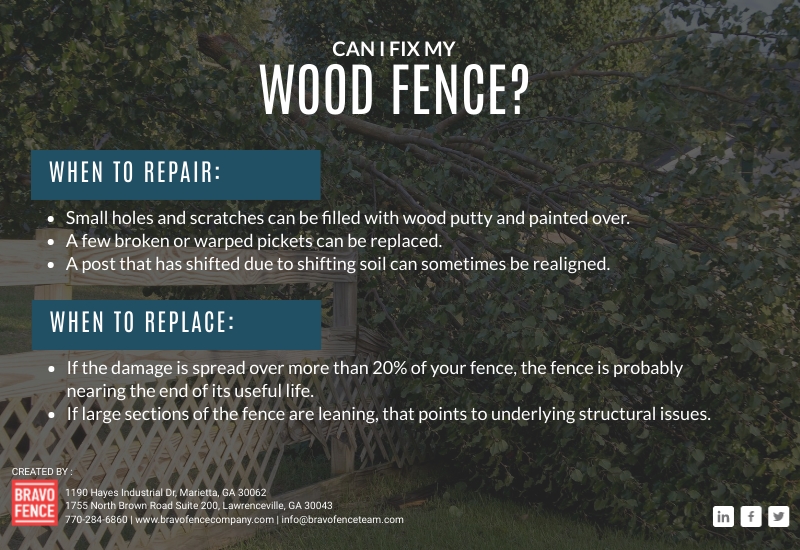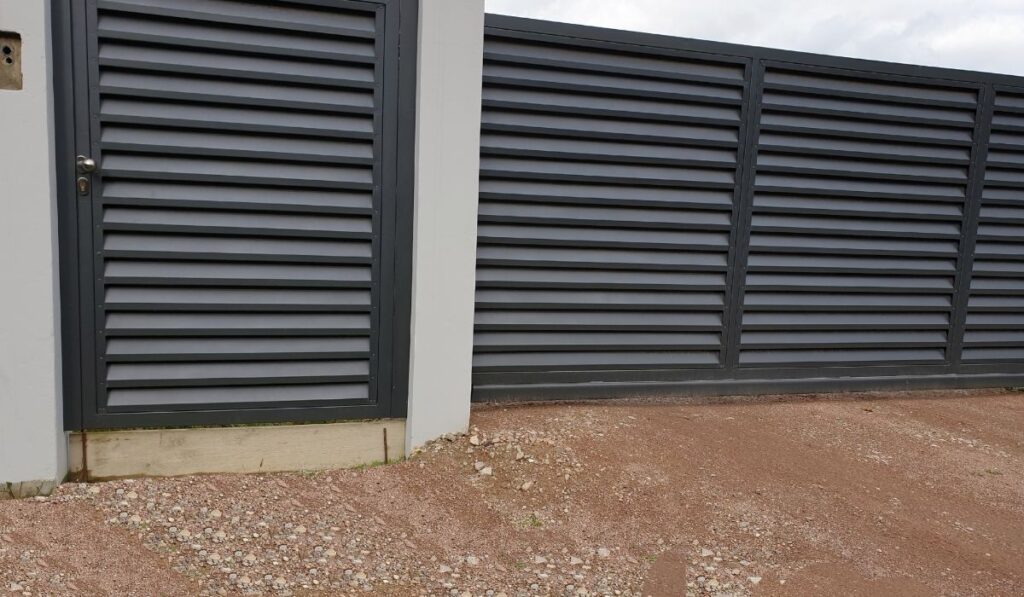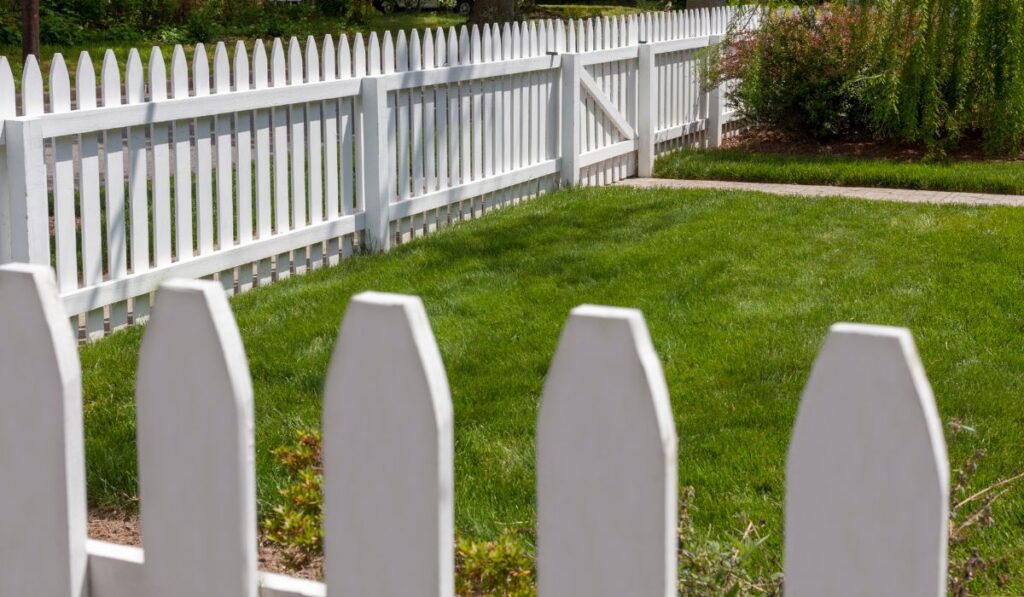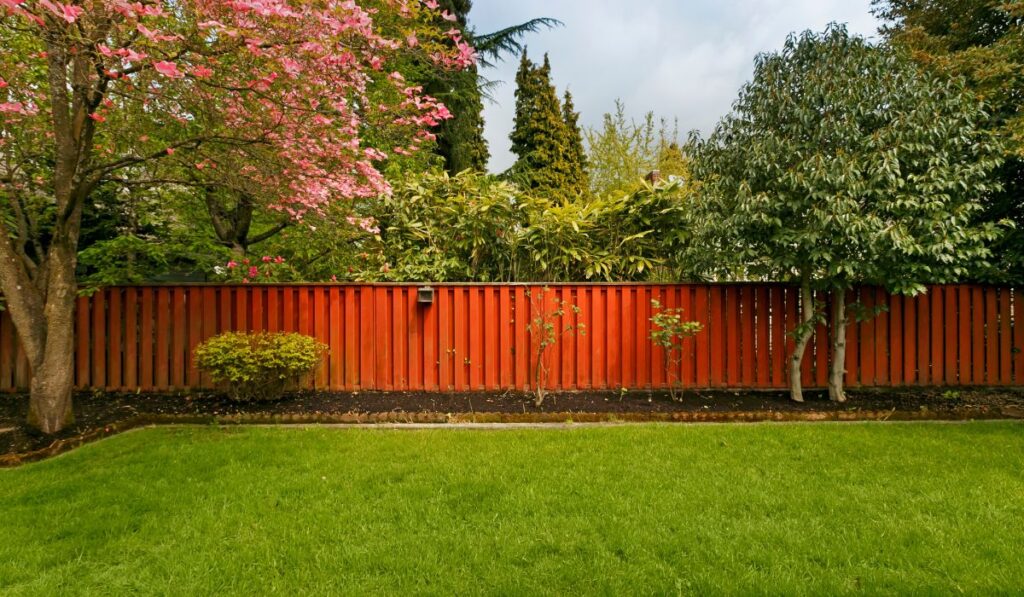A common question we hear from homeowners is, “can I fix my fence.” It’s an important question to ask because while a new fence may be a good value, it’s not always cheap. A high-quality fence is an investment in your property. But if you want to get the full returns from that investment, you need to get the maximum lifespan out of your fence. Maintenance goes a long way to preserving your fence. But there also may be times you need to repair your fence. And while repairs are usually less expensive than a new fence, they are not always the best bang for your buck.
If you are repairing a fence that has reached the limit of its useful years, you’re just throwing money down the drain. It won’t be long before you need more and more repairs. Soon you will have spent more than it would have cost to get a fresh, new fence. So when homeowners ask if they can fix their fence, the answer is that it depends. Read on to learn how to make the right investment in your property, whether it is fixing an old fence or installing a new one.

Wood Fences
Wood is the most common material for residential fences. The wood privacy fence is a nearly ubiquitous feature of suburban living. But wood is more susceptible to damage than some other materials. Because it is an organic material, it is vulnerable to rot and insects. It can also be bleached and dried by the sun. Staining or painting your fence goes a long way toward protecting it from the ravishes of nature, but they’re not a permanent solution. A wood fence should be restrained or repainted about every five years to get the full benefit. And even with that kind of protection, fences naturally age.
When to Repair:
Wood can warp, splinter, and develop holes. If the damage is isolated to a couple of small holes, you can usually fix that with some wood putty and a new paint job. Even if the damage is more extensive, you can still fix your fence by replacing a few pickets or a fence panel. When a post is leaning or rotted, that can be a more extensive repair. Posts are cemented into the ground, so it’s a big job to remove and replace a rotting post. If a fence is leaning because the ground has shifted, you may be able to repair it by adding soil and realigning the post.
When to Replace:
If you find that you have to make repairs season after season, your fence may be nearing the end of its useful life. It may be time to cut your losses and invest in a new fence. The extent of the damage is another factor. If more than 20% of your fence needs repair, it is usually better to replace the whole thing. If large sections of your fence are warped or leaning, even if it’s not 20% of your total fence area, you may be better off with a new fence.
Vinyl Fences
Vinyl fences are popular due to their low price point and almost zero maintenance requirements. There’s just not a lot to do to your vinyl fence beyond cleaning it from time to time. But even a vinyl fence won’t last forever. If your vinyl fence is showing signs of age or damage, you need to decide whether you’ll fix your fence or replace the whole thing.
When to Repair:
A vinyl fence is basically plastic, so not much can damage it. You don’t have to worry about rot or insects as you might with wood. However, after years of exposure to sunlight, the vinyl can become brittle and crack. And although vinyl is more durable than wood, it also can’t be fixed like wood. If your vinyl fence cracks, the only option is to replace the damaged panel. (Vinyl fencing almost always comes as complete panels.) If you have a single crack, it certainly makes sense to replace just that section.
When to Replace:
It’s pretty easy to calculate when to replace your vinyl fence. If 20% or more of the panels need to be replaced, the cost to fix the fence will be significant. More importantly, it is a sign that your fence is reaching its terminal age, and there is no telling how much more you will have to replace in the next few years. At that point, it makes more sense to replace the whole thing than make patchwork repairs. Another reason you might replace a vinyl fence is if the posts are coming loose. One loose post can be fixed. But if your entire fence—or a large section of it—is leaning, you need to start fresh.

Aluminum Fences
Of all the ornamental metal fences, aluminum is one of the most popular choices. It is cost-effective, low-maintenance, and beautiful. Aluminum fence designs range from classical wrought iron styles to clean modern designs. They are the perfect solution for homeowners who want the look of metal without the very high cost of wrought iron or the maintenance requirements of steel. But even an aluminum fence is not entirely worry-free.
When to Repair:
Aluminum fences are hard to damage, but not impossible. The most common damage you’ll find on an aluminum fence is corrosion. Aluminum fences are coated with a durable layer of sealer that prevents most corrosion. But you can get dings and nicks in the coating that allow for small areas of corrosion. (Aluminum can corrode, but not technically rust because it has no iron.)
If corrosion is the issue, it’s pretty easy to fix your fence. You have to sand down the area to remove any loose or flaky paint and create a smooth surface. You can repair any pocking by filling in the space with anti-rust putty you can find at auto part stores. Then you just need to paint the area to match, and the fence is good as new. If that sounds like something you don’t want to do yourself, you can hire a reputable fence company to do it for you.
Aluminum can also dent, especially if it is hit hard with something like a falling tree branch or a misguided vehicle. Depending on the extent of the damage, it may be possible to replace just the section that is bent out of shape. However, it usually takes a professional to take apart and repair a full section of aluminum fencing.
When to Replace:
As with other materials, an aluminum fence follows the 20% rule. If more than 20% of the fence needs repairs, it is best to replace the whole thing. It may not be cheaper than fixing the fence, but a fence that needs that much repair will likely continue to require more and more work. If your fence is really bent out of shape, that would be another good reason to replace it. That kind of severe damage is usually the result of an accident as opposed to normal wear. If a tree falls on your fence or a car crashes into it, the damage can be significant enough to warrant a complete replacement.
Who Should Fix Your Fence?
When homeowners ask, “Can I fix my fence,” they may mean one of two things. They may be asking whether they can personally do the work. Or they may be asking whether the fence can be repaired in general. Those are two very different questions.
DIY Repairs
If you’re considering a DIY repair job, a lot depends on how handy you are. Maybe you do all kinds of fix-it jobs around the house. In that case, the repair largely hinges on what kind of tools you already own and how much time and labor you want to expend on the project. Small fixes on wood fences are often well within the abilities of an average homeowner.
Professional Repairs
However, some jobs require more finesse, experience, and heftier tools than the average homeowner is prepared with. Sanding and repairing corrosion on metal fences requires more labor and the right tools but is also doable on your own. For more extensive repairs, we recommend hiring a fence company like Bravo Fence Company to fix your fence.
Professional Fencing Installation
Of course, sometimes a fence is beyond repair, or the cost isn’t worth the end result. In that case, a strong, attractive new fence may be the best option. And if your fence needs more than repairs, Bravo Fence Company has got you covered. We install fences in a variety of materials and styles. With a Bravo Fence Company fence, you can’t go wrong. Contact Bravo Fence Company today to talk about your fencing needs.






